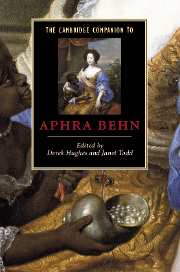Book contents
- Frontmatter
- 1 Aphra Behn: The Documentary Record
- 2 Behn, women, and society
- 3 Aphra Behn and the Restoration theatre
- 4 The political poetry of Aphra Behn
- 5 Behn’s dramatic response to Restoration politics
- 6 Tragedy and tragicomedy
- 7 Behn and the unstable traditions of social comedy
- 8 The Cavalier myth in The Rover
- 9 ‘The story of the heart’: Love-letters between a Noble-Man and his Sister
- 10 Oroonoko: reception, ideology, and narrative strategy
- 11 ‘Others’, slaves, and colonists in Oroonoko
- 12 The short fiction (excluding Oroonoko)
- 13 Pastoral and lyric: Astrea in Arcadia
- 14 Aphra Behn’s French translations
- Further reading
- Index
- Series list
8 - The Cavalier myth in The Rover
Published online by Cambridge University Press: 28 May 2006
- Frontmatter
- 1 Aphra Behn: The Documentary Record
- 2 Behn, women, and society
- 3 Aphra Behn and the Restoration theatre
- 4 The political poetry of Aphra Behn
- 5 Behn’s dramatic response to Restoration politics
- 6 Tragedy and tragicomedy
- 7 Behn and the unstable traditions of social comedy
- 8 The Cavalier myth in The Rover
- 9 ‘The story of the heart’: Love-letters between a Noble-Man and his Sister
- 10 Oroonoko: reception, ideology, and narrative strategy
- 11 ‘Others’, slaves, and colonists in Oroonoko
- 12 The short fiction (excluding Oroonoko)
- 13 Pastoral and lyric: Astrea in Arcadia
- 14 Aphra Behn’s French translations
- Further reading
- Index
- Series list
Summary
The Rover. Or, The Banish't Cavaliers is the most frequently performed and read of Aphra Behn's plays, yet, when it was first staged by the Duke's Company at the Dorset Garden Theatre in London in March 1677, Behn went to some lengths to conceal her authorship of this play. The 'Person of Quality' who wrote the prologue (most likely Behn herself) used masculine pronouns to refer to the author, and this 'Person' further diverted attention away from the playwright by suggesting that this author was 'unknown' (v: Prologue, 5). As the acknowledged author of six plays, Behn was hardly an unknown in London's theatre-going circles at this time. In 1675, indeed, she had been listed in a theatrical compendium as 'Astrea Behn, a Dramatic writer, so much the more considerable as being a Woman, to the present English stage'.
Why, then, did this ‘considerable’ woman dramatist employ these strategies of concealment? The reason most frequently advanced is that Behn was trying to avoid a plagiarism charge relating to her use of material from Thomaso, Or The Wanderer, a play written by Thomas Killigrew, the recently retired Master of the Revels and manager of the rival King’s Players at Drury Lane. The playwright’s own words in the third issue of her play are also often invoked to support this reading. In this issue, Behn finally acknowledged her authorship of The Rover and, in a postscript, she revealed that initially she had trouble getting her play printed because of the rumour that it was Thomaso ‘alter’d’.
- Type
- Chapter
- Information
- The Cambridge Companion to Aphra Behn , pp. 118 - 134Publisher: Cambridge University PressPrint publication year: 2004
- 2
- Cited by



